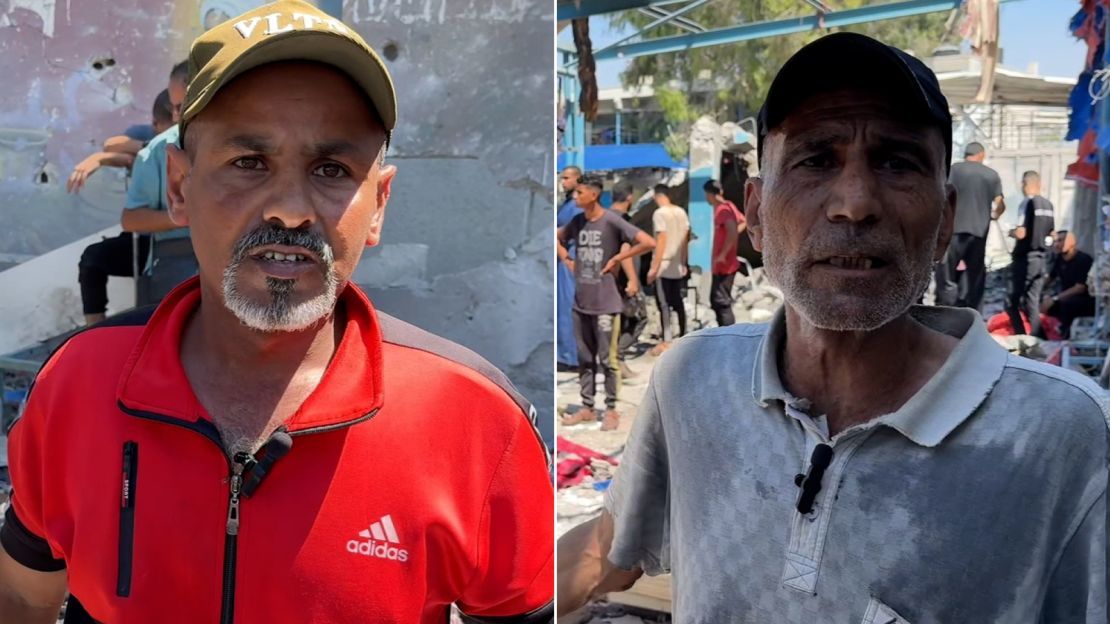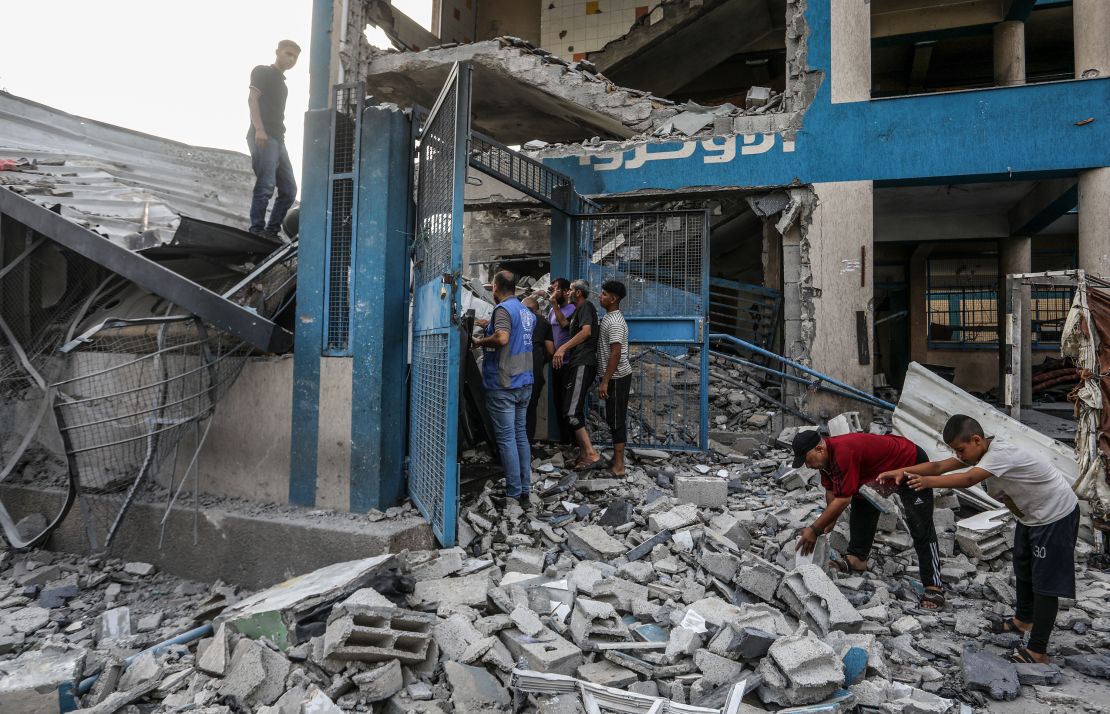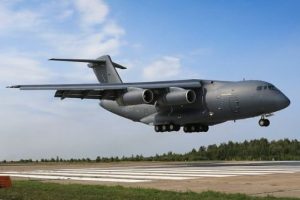Palestinians in Gaza are reeling from a series of devastating Israeli attacks that have renewed focus on the high number of civilian casualties and widespread destruction caused by what Israel claims are targeted strikes against Hamas.
Multiple United Nations officials have described harrowing scenes in the crowded strip following large-scale Israeli strikes in recent days, including of child amputees unable to receive medical treatment after being bombed in so-called safe zones. Meanwhile, the UN chief said the devastation was “incomprehensible and inexcusable” and reiterated calls for the fighting to end.

“We never lived in fear like this. There was blood everywhere,” Gaza resident Ruwaida Issa told a CNN stringer at a school sheltering displaced people that was hit by a double Israeli missile strike on Sunday. “We were running looking for our children; remains of people were scattered all over the yard… We came here to shelter for nothing. There is no safety here. We want this war to stop; we can’t bear this anymore.”
Israeli attacks across parts of Gaza killed at least 60 Palestinians on Tuesday — including a five-year-old child — according to local health officials, in the latest barrage of assaults. Since October 7, almost 70% of schools run by the UN’s agency for Palestine refugees (UNRWA) in Gaza have been hit, the organization warned. More than nine months of Israel’s bombing campaign has turned once-lively neighborhoods into hollow wasteland, triggered mass displacement, crushed the health system and depleted critical supplies.
“Young children were sitting here safely, each one sitting in his mother or father’s lap,” one eyewitness in Nuseirat, central Gaza, told CNN. “Suddenly, missiles fell and tore them apart. Their remains flew on the walls and everywhere. There is no safety wherever you go.”
The Israeli military said early Tuesday it had struck about 40 “terror targets.” CNN cannot independent verify the IDF statements.
Israel launched its military offensive on October 7 after the militant group Hamas, which governs Gaza, attacked southern Israel. At least 1,200 people were killed and more than 250 others abducted, according to Israeli authorities.
Israeli strikes in Gaza have since killed 38,713 Palestinians and injured another 89,166, according to the Ministry of Health there.

Since Friday, Israel has launched waves of deadly missile strikes and attacks on what it called “terrorist” targets in central and southern Gaza as its military hunts down Hamas’ leadership with the aid of US-made munitions.
On Sunday, the Israeli military claimed to have targeted Hamas’ military chief and killed a Hamas brigade commander in an airstrike in Khan Younis. It came as Israeli intelligence services said dozens of Hamas operatives involved in the October 7 attacks on Israel had been killed in the past week following “intensified activity” in Gaza. CNN cannot independent verify IDF statements.
The human toll from Israel’s weekend bombardment has been devastating.
The strike targeting Hamas’ military chief hit a displacement camp in Al-Mawasi, which had been designated by the Israeli military as a safe zone for Palestinians fleeing the fighting elsewhere, killing at least 90 people and injuring 300, according to the Gaza Health Ministry. CNN has no way of verifying the casualty numbers reported by the ministry, which does not differentiate between civilians and combatants killed.
Overwhelmed hospitals struggled to cope with the dead and wounded. One senior staffer at UNRWA, the UN’s agency for Palestinian refugees, described the Nasser hospital, which took in casualties of the strike, as “the most horrific scenes I have seen in my nine months in Gaza.”
“I saw toddlers who are double amputees, children paralyzed and unable to receive treatment, and others separated from their parents,” said Scott Anderson, director of UNRWA Affairs in Gaza, in a statement. “Parents told me in despair that they had moved into the ‘so-called humanitarian zone’ in the hope that their children would be safe there.”

The following day, at least 22 people were killed in a double Israeli missile strike that used US-made munitions on the Abu Oreiban school in the Nuseirat refugee camp, central Gaza, where hundreds had taken refuge.
The Israeli military claimed its air force struck the location where “a number of terrorists” were operating. But Nuseirat residents told CNN mainly women, children and the elderly were sheltering at the school, which had been turned into a shelter run by UNRWA.
“We are pulling a hand here and a leg there from under the rubble. Civilians who did nothing wrong,” one man interviewed by a CNN stringer at the scene said.
‘Where should we go?’
Following the strikes on the school in Nuseirat, where thousands of displaced people are sheltering, families and UNRWA teams were helping to clean through the rubble.
In the school yard, displaced families were hanging up their laundry but inside, crying women sat on the floor mourning their loved ones — torn clothes and rubble lay in piles in the yard.
An injured woman and a girl in bandages cooked between the classrooms, while families and children stood in line for donated meals, carrying pots and plates and begging a man for some rice.
“We are scared … My daughter was injured, my husband’s children were all injured. The place we were sheltering in all collapsed on us,” Mary Al Sammouna, a displaced woman from Gaza City, told a CNN stringer.
“They are targeting everything; houses, human beings, stones, they didn’t spare anything. But we are staying here even if we will die here. A person cannot leave his home twice; we have no other place to go to.”
Samir Tafesh, a displaced man from Gaza City, said those sheltering at the school are trying to get back to some kind of normalcy following the Israeli attack.
“We are cleaning now, thank God we are still alive after the heavy bombardment, and we are trying to get back to normal life. We call for a ceasefire from both sides,” he said.
“We are afraid that bombardments can happen again and again, but where should we go? We have no other place but this school; it is the safest for us,” he added.

Fresh pressure on negotiations
The latest Israeli strikes have put new pressure on the success of ongoing ceasefire and hostage negotiations, which hit yet another roadblock last week.
In a post on X Tuesday, UN Secretary-General Antonio Guterres decried the violence in the strip and renewed calls for Israel and Hamas to agree a long-touted deal for a ceasefire and the release of Israeli hostages held in Gaza.
“The extreme level of fighting and devastation in Gaza is incomprehensible and inexcusable. Nowhere is safe. Everywhere is a potential killing zone,” Guterres said.
“It is high time for the parties to show the political courage and political will to finally reach a deal.”
Israeli Prime Minister Benjamin Netanyahu – who has repeatedly vowed to eliminate Hamas – claimed the targeting of the group’s military chief Mohammed Deif would improve the chances of a deal to free hostages, rather than harm them.
“Hamas is weak. The more you hit it, the more you push for a deal,” he told Israel’s Channel 14 on Monday. It remains unclear if Deif died in Saturday’s strike.
The Israeli military is verifying whether he was killed while Netanyahu acknowledged it is uncertain whether he died.
Source: CNN






















Add Comment